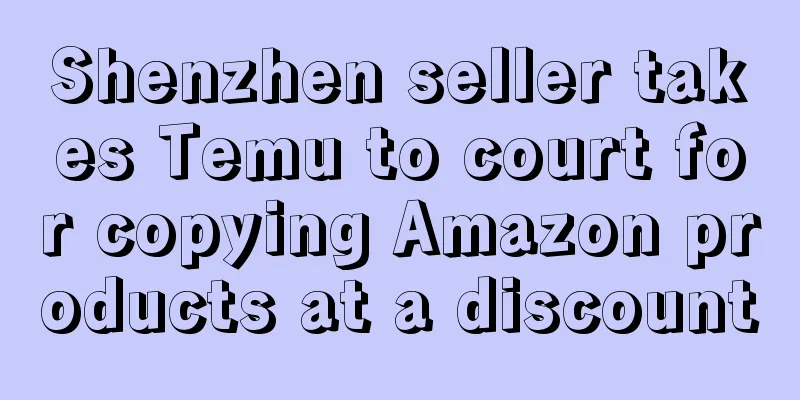|
From the United States to Japan, Temu's expansion is unstoppable. Its ultimate cost-effectiveness and viral fission marketing are its killer weapons. Under the absolute price crushing, more and more Amazon sellers are facing the threat of Temu products.
Shenzhen seller takes Temu to court for copying Amazon products at a "discount" price "The entry of Temu has further muddied the cross-border market." This is the common voice of many Amazon sellers.
Since its launch, Temu has quickly carved out a place in the overseas consumer market with its rock-bottom prices. While many Amazon sellers are facing the pressure of internal circulation, they are also facing the brutal "plundering" of Temu merchants - moving the listings on the Amazon platform intact to Temu.
"I made a non-standard product and occasionally went to Temu to check it out. All my pictures on Amazon were stolen. I couldn't find the complaint entrance and couldn't contact the seller." "My product has also been copied, and it has more than a hundred reviews." "Temu has no moral principles. Most of the product images are directly copied from Amazon. The platform ignored my complaints."
Judging from the feedback from sellers, Temu merchants have a relatively weak brand awareness. Many of them have become Amazon product porters and simply copy any popular links.
Although Temu has made a solemn statement on its website that sellers are prohibited from selling products that infringe third-party trademarks, copyrights or patents, the actual supervision is lacking. Some sellers bluntly said that the platform generally condones such infringements and does not deal with them even if they complain. There are even investment managers who ask merchants to move popular products from major platforms.
The continued fermentation of such infringement incidents has also caused many Amazon sellers to suffer. It is learned that the same product, from pictures to descriptions and other listing information is exactly the same, but the plagiarized version on Temu has achieved sales that surpass the original product with a lower price.
In this situation, some Amazon sellers had to take legal action to fight Temu and its suppliers.
FitBeast is a Chinese brand that specializes in sports equipment, and its products are sold on Amazon for $25.99. However, some time ago, the brand found that similar products on Temu were sold for less than $5. Fearing that it would be punished for violating Amazon's fair pricing policy, it sued Temu in May, accusing Temu and its sellers of infringing copyright and damaging its sales. "After seeing the success of FitBeast's exercise equipment, Temu and its sellers copied and sold the same products, which constituted business theft," the brand said in the lawsuit.
Another cross-border company from Shenzhen also sued Temu in April. The main product of the company's brand Hicober on Amazon is a microfiber hair towel priced at $29.99, while the same product on Temu is only $5.88.
At present, the two lawsuits have not yet been resolved. It is foreseeable that due to the lack of a sound management policy on the platform and the infringement of a large number of Temu sellers who directly steal the fruits of labor without any moral integrity, the road to rights protection for Amazon sellers is long and difficult. Amazon kicks Temu out of its pricing algorithm In fact, Amazon's fair pricing policy has long constrained sellers' pricing power. Its price search algorithm uses automatic and manual tracking methods to check whether the products sold on the platform are comparable to those of competitors. If the seller's pricing is unreasonable, Amazon will cancel the Buy Box. For those merchants who repeatedly violate the fair pricing policy and set prices too high, Amazon will ban them from selling.
Temu, which has the advantage of a cheap domestic supply chain, is committed to selling cost-effective products. A large number of products priced at only a few dollars dominate the best-selling list, and their prices are much lower than those of similar products on the Amazon platform. According to YipitData, Temu's total merchandise sales increased from US$141.5 million in January this year to US$634.8 million in May. This brute force strategy is helping Temu continue to erode the overseas market.
Therefore, facing Temu's overwhelming pricing advantage, many Amazon sellers are worried about being "liquidated" for violating the principle of fair pricing. However, Amazon recently announced that Temu does not meet the implementation standards of its pricing policy, so it has removed it from the price algorithm.
At present, the price competitiveness of products on Temu is far better than that of Amazon sellers. However, correspondingly, the product quality is also lacking in guarantee, and infringement is extremely rampant, so Amazon is unwilling to include it in the price comparison range.
On the other hand, although Amazon is also committed to providing consumers with cost-effective products, if it engages in a head-on price war with Temu, it may result in a large number of sellers being punished or forced to lower prices to unprofitable levels.
Nowadays, Temu's abnormal low-price policy is being denounced by more and more cross-border merchants. If Amazon also joins the battle and integrates into the vicious competition of winning by price rather than quality, then the ecology of cross-border merchants will continue to deteriorate, and they will be forced to move forward in the pathological low-price involution, and be eliminated in the profit space that has been ceded.
Fortunately, Amazon seems to have no intention of getting involved in the low-price dispute with Temu. For sellers, price is never the real winning factor at any time. Only products with serious homogeneity and lack of competitiveness will fall into the quagmire of internal circulation. The key to long-term survival is to build a solid product moat.
|










